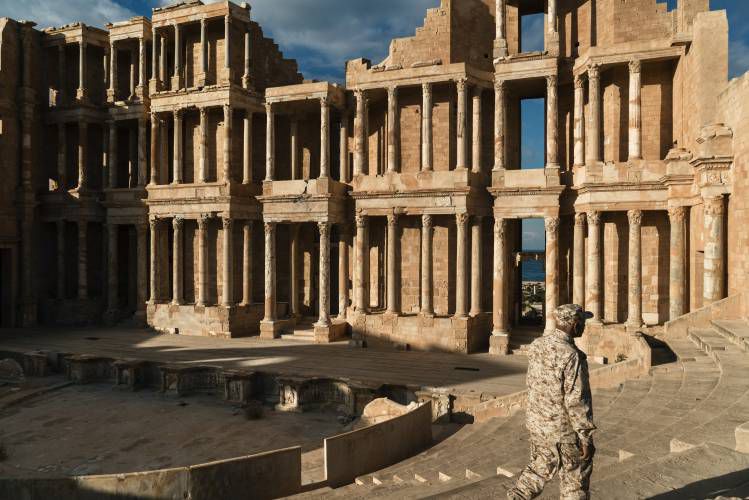- Tue April 23, 2024|
 Alwasat FM|
Alwasat FM|

Perched on the edge of Libya's Mediterranean coast, the ancient city of Sabratha remains an awe-inspiring spectacle, the pink columns of its amphitheater towering above turquoise waters.
But the world heritage site is classed as "endangered" by UNESCO, its majestic structures pockmarked by mortar and small arms fire.
Shell casings and bullets still litter the surrounding earth, a year after clashes between rival armed groups.
Locals say snipers positioned themselves at the top of the amphitheater, once a jewel of the Roman Empire.
Bringing bluffshed back to the gladiatorial arena some 18 centuries after it was built, 39 people were killed and 300 wounded in the fighting.
Today, the site around 70 kilometers (45 miles) from the capital lies eerily abandoned, encircled by parched grass and weeds.
Since the topping and killing of Libya's dictator Moamer Kadhafi in a 2011 uprising, Sabratha has become a key departure point for illegal migration.
Smugglers and militias have profited amply from a chronic security vacuum.
It is from the long and deserted shores a few kilometers (miles) from ancient Sabratha that most migrants start their perilous boat journeys towards Europe.
- 'Permanent danger' -
UNESCO declared Sabratha to be at risk in July 2016, along with four other Libyan sites on its World Heritage list.
The UN's cultural organization based its decision on two factors - "damage already caused" and vulnerability to future destruction.
It noted that "armed groups are present on these sites or in their immediate proxies".
Experts fear worse is to come for the country's historic sites, as armed groups continue to vie for ascendancy.
Libya's archaeological heritage is at great risk, warns Mohamad al-Chakchouki, head of the North African country's department of antiquities.
The "entrenchment of armed groups inside archaeological sites and the battles which have unfolded near the sites, including Sabratha, pose a permanent danger", he told AFP.
The preservation of sites was once entrusted to Western teams.
But these experts have not traveled to Libya "for four years, because of the chaos and insecurity", said Chakchouki.
Spread out over 90 hectares (220 acres), including a part engulfed by the sea, Sabratha is one of three former cities that constituted Roman Tripolitania.
The others are Oea - modern-day Tripoli - and Leptis Magna in western Libya that was one of the sites classed as endangered by UNESCO two years ago.
At the mercy of the scorching summer sun and the salty sea breeze, Sabratha sufferers from stone erosion and degradation, said Mohamad Abu Ajela, an official at the city's office of antiquities.
But the "damage caused by man is a greater fear", he said.
A Spanish archaeological mission recently visited Sabratha and signed an agreement to restore some areas, including the theater.
But completion of the work "depends on the security situation", Ajela said.
- Urbanization and looting -
Alongside armed conflict, several protected Libyan sites are threatened by uncontrolled urban expansion.
One example is Cyrene, an ancient Greek city in northeastern Libya.
Exploiting the chaos, people have claimed ownership of land and built within the archaeological site's perimeter.
Loting is another threat to these sites, as the lack of security has led to illicit excavation and smuggling of antiquities.
Several thefts of ancient objects have been reported.
In March, Spain's interior ministry announced the seizure "of numerous works of art" from the Cyrenaica and Tripolitania regions, including seven mosaics, sarcophagi and pieces of Egyptian origin.
Madrid said it had proof that two necropolises were looted by "terrorist groups".
Officials in the antiquities department attempt to save what they can, often through desperate measures.
Museums have closed - including in Tripoli - and some archaeological treasures have been transferred to a "safe place", Chakchouki said.
Comments